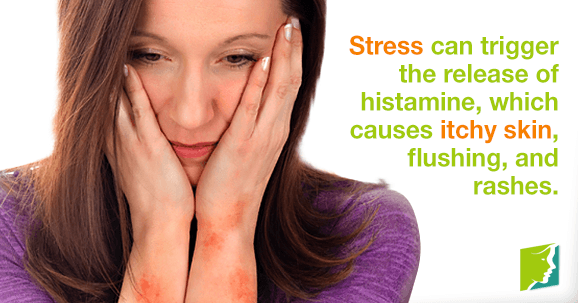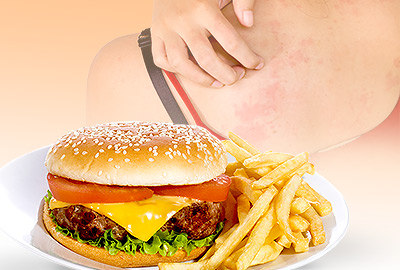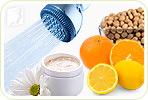One out of three people report experiencing persistent stress and excessive anxiety on a daily basis. Stress is a natural defense response to environmental factors, and can be beneficial in small doses. Stress makes you hyper-aware of your surroundings and can help you complete whatever task is at hand. However, stress can be harmful when it becomes excessive and builds up. Excessive stress can affect your health and cause symptoms like headaches, insomnia, itchy skin, and weight gain. It is important to try and manage stress as much as possible.
Stress and Itchy Skin
Stress can be directly linked to itchy skin. High stress levels release a chemical called histamine, which causes itching, flushing, and sometimes rashes. This response is similar to an allergic reaction and can be extremely uncomfortable. Additional causes of itchy skin can include environmental or internal factors like heat, sunburn, extreme cold weather, allergies, eczema, and psoriasis.
Remedies
It is important to keep your skin healthy and protected by moisturizing often. It is helpful to apply moisturizer right after a shower while your pores are still supple and open. It is also beneficial to try and reduce stress as much as possible to prevent itchy skin and other ailments caused by stress.
Coconut oil
Coconut oil is a natural moisturizer that can be applied all over the body to nourish dry, itchy skin. It is antimicrobial and antifungal, so it is helpful for cleansing and protecting skin.
Avocadoes
Avocadoes are a rich source of essential fatty acids, which are greatly beneficial for skin and hair.
Oatmeal
Oatmeal is soothing and moisturizing, and can help relieve itchiness and pain caused by cracked skin. You can add ground oatmeal to a warm bath for full-body treatment.
Apple cider vinegar
Apple cider vinegar can be helpful for treating dry, cracked, and infected skin. Just dilute some apple cider vinegar onto a cotton swab and rub it on the affected areas.
Exercise
An effective way to reduce stress is to exercise regularly. It is generally recommended to get at least 30 minutes of aerobic activity every day, or at least five times a week. Exercising releases “feel-good” neurotransmitters in the brain, like endorphins, and significantly increases energy levels and improves mood. Walking, cycling, and swimming are all good forms of low-impact workouts.
Yoga
Yoga is a beneficial relaxation technique that also improves flexibility, incorporates breathing exercises, helps clear the mind, tones the muscles, and its low-impact nature will protect your joints.
Herbal supplements
Sedative herbs can help relieve stress and anxiety, calm the nerves, and soothe restlessness. Hops, valerian, lemon balm, and passion flower are all soothing herbs that are widely used for easing stress and anxiety.
Stress can cause itchy skin by releasing a chemical called histamine, which causes itching and irritation. It is important to reduce stress as much as possible in order to avoid ailments like headaches, itchy skin, and weight gain. Protecting your skin with natural remedies, like coconut oil and oatmeal, can help keep it healthy and prevent itchy skin.
Sources
- Mayo Clinic Staff. (2014). Stress management: types of relaxation techniques. Retrieved November 26, 2014, from http://www.mayoclinic.org/healthy-living/stress-management/in-depth/relaxation-technique/art-20045368?pg=2
- National Health Service UK. (2014). Itching - Causes. Retrieved November 26, 2014, from http://www.nhs.uk/Conditions/Itching/Pages/Causes.aspx




